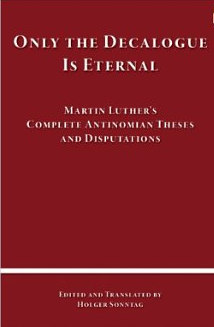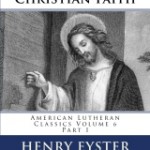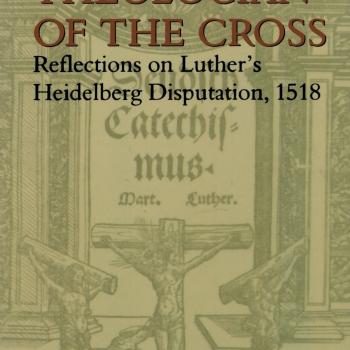
[Note: this post was accidently published earlier today under Trent Demarest’s name by me, Nathan Rinne.]
Again, not long ago at the Brothers of John the Steadfast blog, a discussion was started which came largely to focus on Pastor Jordan Cooper’s writing a book about theosis. One of the more helpful, clarifying, and enlightening comments came from Pastor Holger Sonntag, the translator of Martin Luther’s Antinomian Disputations available through Lutheran Press.
Here is how Pastor Sonntag responded to T.R. Halvorson’s article. The boldface emphases in the post are Pastor Sonntag’s:
+ + +
I’ll provide a running commentary to your article, if you don’t mind.
Ok, I take this to be your core proposition:
Despite what seems to be a dizzying array of ideas and movements that undermine, erode, or outright displace justification, really, there is a single thread running through them: theosis. When we see this single thread, we can be nimble in defending the flock.
Then you lay out that you want to track this erosion / displacement of justification (I assume you mean: “justification by grace through faith in Christ alone”—there’s also “justification by good works,” see Rome etc.; you clearly don’t want that—which is great!)
The problem I see at this point, and the messy discussion really has borne this out, that you identify “theosis” right off the bat with “undermine, erode, or downright displace justification.” Some folks took issue with that (note to self: “theosis” can have different meanings), and you’ve been talking about “theosis” ever since—instead of what you were really aiming at, which was discussing various attempts to marginalize and replace the biblical doctrine of justification by grace through faith in Christ alone.
But, only hindsight is 20-20. And, I think, people of good will should be able to reset their heads to say: ah, ok, maybe this wasn’t set up so well, but the biblical doctrine of justification should be a concern for all of us—and certainly pastors should be vigilant in this area, as our eternal lives are at stake. So, let’s talk about that.
Because that’s really what then ALSO happened: how is our growing sanctification properly understood (taught/preached) in its relation to the doctrine of justification? But the other issues, like a mighty avalanche, always kept intruding back into this important discussion. So the differences that have been voiced—at times quite harshly—were they about terminology? Were they about substance? I’m inclined to say “yes” to both, but because the terminology discussion generated so much heat, and not very much light, we’ve perhaps not advanced as far as we could have in the matter of substance, by God’s grace.
Anyway, as to your substantial points, the various objectionable forms in which you observe “theosis” around us and among us.
First, the EO model. I let others with more knowledge about EO theology speak to it in greater detail, specifically as to whether EOs really believe in a bloodless atonement (by incarnation only). If they did, however, they are certainly wrong.
I add, though, that also for the Lutherans the incarnation is amazing in that it elevates our human nature to divine glory at the right hand of God because at that point in time the personal union is formed (cf. SD VIII, 13). Are we saved by this exaltation in the virgin womb of Mary? No. But I’d say it sure is great comfort to know that God, in the very divine-human person of Christ, has brought about such an indestructible embodiment of the Gospel promises made to wretches like us.
That said, a key text in the discussion seems to be 2 Peter 1:4. First of all, let’s admit: it doesn’t mention “theosis” or “divinization” by name. Since those terms are causing some confusion among us, we should stop our EO interlocutors right there: “Wait. Let’s first look at what it does say. What it does say is that we become partakers of the divine nature by means of what?—our good works? Our sanctified life? No, by means of God’s promises!”
Safe to say, where God’s word speaks about this type of promises, it has faith, not love, in view! So, a great Lutheran text, thank you very much.
This, I submit, is really the key question here: how do we become partakers of the divine nature? By faith alone? By love alone? By faith and love to varying degrees? This is how we can use the proper doctrine of justification as a tool to avoid falling into legalism in other doctrines.
Luther’s own interpretation of the text bears out that the text is really a great text of the Bible and for (in favor of) the Lutheran faith (too bad we don’t talk about it more often), AE 30:155:
Through the power of faith, [the apostle Peter] says, we partake of and have association or communion with the divine nature. This is a verse without a parallel in the New and the Old Testament, even though unbelievers regard it as a trivial matter that we partake of the divine nature itself. But what is the divine nature? It is eternal truth, righteousness, wisdom, everlasting life, peace, joy, happiness, and whatever can be called good. Now he who becomes a partaker of the divine nature receives all this, so that he lives eternally and has everlasting peace, joy, and happiness, and is pure, clean, righteous, and almighty against the devil, sin, and death. Therefore this is what Peter wants to say: Just as God cannot be deprived of being eternal life and eternal truth, so you cannot be deprived of this. If anything is done to you, it must be done to God; for he who wants to oppress a Christian must oppress God.
All this is included in the term “divine nature,” and St. Peter has used it for the very purpose of including all this. It is surely something great when one believes it. But, as I have stated above, with all these instructions he does not lay a foundation for faith but emphasizes what great and rich blessings we receive through faith. For this reason he says: “You will have all this if you live in such a way that you give evidence of your faith by shunning worldly lusts.”
Notice how Luther, at the end, puts sanctification in there! Outstanding, I’d say. He’s a master teacher because he’s a master listener at the feet of the apostles: Even though we’re saved by faith alone, genuine, saving faith is never devoid of love, the “evidence of your faith.”
Talking about promises and faith, for Lutherans this invariably means that we’re talking about Christ—not as absent (at least according to his human nature), but as present in us according to both natures. Primarily as the bringer of our justification, but secondarily also as “engine” of our sanctification.
The reference to 2 Peter 1:4 in SD VIII, 34 drives Christ’s presence in us home:
St. Peter testifies with clear words that even we, in whom Christ dwells only by grace, have in Christ, because of this exalted mystery, “become partakers of the divine nature” (2 Pet. 1:4), what kind of participation in the divine nature must that be of which the apostle says that “in Christ the whole fullness of the deity dwells bodily” (Col. 2:9) in such a way that God and man are a single person!
From this we learn: Christ, here identified as “the divine nature” (synecdoche — a “part” for the whole), dwells in us Christians by grace (that is, by faith in the gospel promises mentioned by Peter, cf. Eph. 3:17!). The gifts Luther identified with the “divine nature” cannot be isolated from Christ’s / God’s presence (cf. Ep. III, 18). The way this divine nature dwells in us is different from the way this same divine nature dwells in Christ bodily.
At any rate, this indwelling of the divine-human Christ our confessions call our “highest comfort” (SD VIII, 87):
Hence we consider it a pernicious error to deprive Christ according to his humanity of this majesty. To do so robs Christians of their highest comfort, afforded them in the cited promises of the presence and indwelling of their head, king, and high priest, who has promised that not only his unveiled deity, which to us poor sinners is like a consuming fire on dry stubble, will be with them, but that he, he, the man who has spoken with them, who has tasted every tribulation in his assumed human nature, and who can therefore sympathize with us as with men and his brethren, he wills to be with us in all our troubles also according to that nature by which he is our brother and we are flesh of his flesh.
This is quite an amazing text. Is it not? We’re not alone, according to the promise.
Evidently, this doesn’t mean, as you fear, that we look for lasting comfort within us (even though we should be able to detect something, even something seeming insignificant, of the new life within us — if not, where’s the fruit of our faith? — but finally, even that something is corrupted by sin — hence, lasting, final comfort in temptations we find in the objective promise offered to all in the means of grace). We still look to the promise outside of us. But that promise assures us: Christ is with us, even within us, with his gifts and with his human nature, according to which he is our brother and we are flesh of his flesh: Comforting and leading us; pleading and interceding for us; strengthening us during our time in the church militant in our battles against the sinful flesh we wage to drive the old Adam back more and more in the power of the Holy Spirit.
This quote, I submit, gives a glimpse at the fullness of the biblical gospel that is all the more surprising because that gospel comes to us in very humble, simple external forms that, by Christ’s institution, contain nothing flashy or glittery.
Your formulations at the end of your section on EO I find, therefore, in need of correction: Of course, we want a Christian life that’s visible! Why else does Paul exhort us to “put on” the new man (Eph. 4; Col. 3)? If you “put on” something (not just a show, but, e.g., clothes), it becomes visible.
This is not automatically an error. It becomes an error if, as I said above, this visible sanctification is mixed in with justification (and to the extent the EO or anybody else do this, they are in error, no matter what their terminology—plain and simple). Hence Luther’s sound advice: leave your good works between you and your neighbor and cling to God by faith alone. But those good works are visible. If not, what about the visible fruit of faith? Faith is invisible. True enough. So is our perfect righteousness and holiness. Our life before God, so to speak. But as we also must relate to our neighbor in this life, our Christian-ness must become visible. If it doesn’t, not even in some incipient way, it’s also not somehow “invisibly” present before God. Of this Scripture and the confessions assure us.
This shows, as I pointed out earlier, that this discussion is not really about “theosis” (red herring alert!!) but about sanctification in the life of the Christian. Period.
On to the Roman model, as you describe it! Here again, as stated above, to the extent Rome mixes our incipient renewal in love with our standing before God, it is in error, whether it expresses this error in Greek, Latin, Hebrew, German, Norwegian, or any other language or terminology.
However, I think, again, that your presentation of what Luther taught against Rome is in need of an important correction: Luther did not reject the notion of “infused grace” out of hand (in terms of the Spirit’s gift/power in us, enabling us to do the Ten Commandments). He rejected it when it was mingled into the article of our justification before God.
In fact, he condemned the antinomians of his time for not teaching “infused grace.” Trent already quoted that text earlier. But I think it bears repeating at this time because it is really, really important that we don’t fall into false dichotomies here (AE 41:114—from his 1539 treatise on the church and the councils, also available from Lutheran Press, by the way):
Christ did not earn only gratia, “grace,” for us, but also donum, “the gift of the Holy Spirit,” so that we might have not only forgiveness of, but also cessation of, sin. Now he who does not abstain from sin, but persists in his evil life, must have a different Christ, that of the Antinomians; the real Christ is not there, even if all the angels would cry, “Christ! Christ!” He must be damned with this, his new Christ.
Harsh, but necessary words from the chief teacher of our church—spoken not when he too was a “Lutheran” neophyte (in 1517), but as a mature leader of the emergent Lutheran church in 1539, as that church was preparing for the long-awaited general council of the entire Western Church.
And as I wrote in my first post, we need to be careful not to play off the indwelling of Christ against the indwelling of the Holy Spirit. After all, the Spirit is Christ’s Spirit who proceeds from him and the Father and takes what is Christ’s and makes it known among us, John 16:14 (there’s also a great sermon by Luther on that text available from Lutheran Press).
We could even say with Augustine: the outward works of the Trinity are indivisible, unlike the inner-trinitarian relations, as Luther affirms in his 1543 Treatise on the Last Words of David (AE 15:302):
If I ascribe to each Person a distinct external work in creation and exclude the other two Persons from this, then I have divided the one Godhead and have fashioned three gods or creators. And that is wrong. Again, if I do not ascribe to each Person within the Godhead, or outside and beyond creation, a special distinction not appropriate to the other two, then I have mingled the Persons into one Person. And that is also wrong.
A little later (p. 309) he applies this to the question at hand: “the Holy Ghost sanctifies Christendom, so does the Father, so does the Son, and still there are not three sanctifiers, but only one Sanctifier, etc. ‘The works of the Trinity to the outside are not divisible.'”
So, instead dividing miserly and wrongly, we should rejoice in the richness of God’s mercy toward us poor, miserable sinners, as it is revealed to us in Scripture (cf. the Smalcald Articles on that richness).
Now, we could go through your presentation of Osiander, the Finns, the Emergers, the Perichoretics, or whoever—my line will always be: to the extent they mix our incipient renewal (and that includes confidently and correctly sharing the faith with those who do not know it) with our justification before God, they are in error and are badly misleading people.
However, that said, this is not a necessary consequence of believing and teaching that the triune God dwells in us and permeates us, that we are partakers of the divine nature! It is not a necessary consequence of exhorting Christians to a life that is visibly worthy of their calling.
As you’ve seen above—or at least as I’ve tried to demonstrate above—this is all taught by our sound Lutheran teachers, even by Scripture itself. We’d do a disservice to the Church if we dumped all this out. In fact, we’d cease to be a Christian church.
The error is, rather, a necessary consequence of their legalistic doctrine of justification. E.g., evangelicals of various stripes suffer from this, even those, I’d venture to guess, who would reject any association with, or who are totally ignorant of, the labels “theosis,” “perichoresis,” “indwelling,” etc.
It’s a problem of their doctrine of justification. As Luther said, if you get that one wrong (or even ignore it), you’ll get everything else wrong as well.
Now, as I’ve said in my first post. This is one discussion we obviously and urgently need to have. Your post is the best evidence for it, if I may say so.
Another discussion we then also need to have is terminological in nature: should we call what the Lutherans soundly teach on our increasing holiness and heavenly perfection “theosis”? Here I’d say no. I liken this to the attempt by some in our circles to rename the worship service as “mass” (or its EO pendent, “divine liturgy”) because, in their minds, “worship” is somehow automatically “evangelical” and “anti-sacramental.” Now, did Luther call worship “mass”? Yes. Did the confessional writings authored by Melanchthon in 1530/31 call it “mass”? Yes. Should we today? No.
Why? It’s not essential to our faith to do so. And we haven’t been doing it for a long time, in part, no doubt, upon Luther’s 1534 advice (cf. AE 38:226f.). So now that term has become exclusively associated with the Roman Catholic Church and their utterly false understanding of the Supper. The same would be true of pastors calling themselves “fathers.” Theologically legitimate, if understood properly (see LC on the Fourth Commandment), but unfortunately misleading today.
Here terminological restraint is a good work of Christian love that’s also external and hence both visible and audible. Terminology is, to a good measure, part of the vast area of “adiaphora,” things neither commanded nor forbidden by God but introduced by the church for good reasons, i.e., here for the explicating and defense of the biblical faith.
Restraint and uniformity in these areas out of humble love—not an inconsiderate striving for novelty or an “anything goes” attitude—are essential to preserving the unity of the Church in the one true faith. It’s kind of like our worship services, as we’re all painfully aware.
My two cents.











